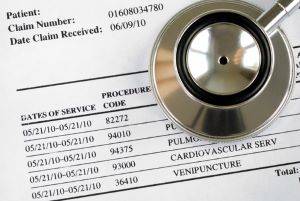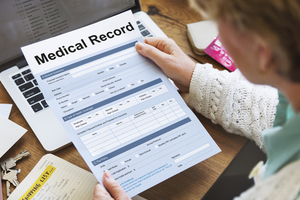Wisconsin Personal Injury Attorneys
Representing Victims of Car, Truck, and Other Accidents in Appleton, Oshkosh, Green Bay, Waupaca, and the rest of northeast Wisconsin
JOHN D. CLAYPOOL | RICHARD T. ELROD | KEVIN LONERGAN | MICHAEL S. SIDDALL | KATELYN P. SANDFORT
Aggressive Advocacy • Significant Results • Since 1959
Life can take unexpected turns, and accidents can happen when we least expect them. If you or a loved one have suffered from a personal injury, you may be left with unmanageable medical expenses, long-term care needs, lost wages, and an inability to care for your family. You may feel overwhelmed and frustrated by your inability to quickly recover money from an insurance company.
A personal injury isn’t just an accident – it’s a disruption that can affect your well-being and your future. When Your Future Is At Stake, Herrling Clark Law Firm, Ltd. will provide unwavering support and expert legal representation, so you can focus on healing while we handle the legal aspects of your case.
With offices in Appleton, Oshkosh, Green Bay, and Waupaca, Herrling Clark Law Firm, Ltd. will tirelessly pursue maximum compensation for your injury claim. Contact us today to discuss your situation during a free initial consultation.
Effective Courtroom Strategy
Our team of dedicated personal injury lawyers possesses a wealth of experience in handling a wide array of cases, ranging from the aftermath of automobile accidents to the complexities of product liability claims. We understand that each case is unique, and we are committed to meticulously investigating every detail to ensure that justice is served for you or your loved ones.
Our detail-oriented attorneys take the time necessary to prepare a comprehensive and compelling case. We understand that the success of a personal injury claim hinges on the strength of the evidence presented. This commitment to detail and preparation allows us to navigate the complexities of personal injury law and provide you with the highest level of representation.
Many cases can be resolved outside of the courtroom, and we leverage our negotiation skills to ensure that you receive fair and just compensation without unnecessary delays. In the event that negotiations do not yield a favorable settlement, rest assured that Herrling Clark Law Firm, Ltd. is prepared to take your case to trial.
If you or a loved one has suffered an injury, timing is critical. The sooner you initiate your case, the more likely it is that you will preserve evidence necessary for your recovery. We handle the following types of personal injury cases:
Herrling Clark Personal Injury Law Firm
Serving Northeastern Wisconsin
Tell us about your case
Frequently Asked Questions (FAQs)
 After establishing your right to recover, the next step is to determine if there are insurance companies who are liable for payment of your damages. At times, more than one insurance company may be liable. If the at-fault party carried no insurance, there may be other parties with a legal relationship to the at-fault party who have insurance.
After establishing your right to recover, the next step is to determine if there are insurance companies who are liable for payment of your damages. At times, more than one insurance company may be liable. If the at-fault party carried no insurance, there may be other parties with a legal relationship to the at-fault party who have insurance.
The laws pertaining to the different types of insurance coverages and the right of insurance companies to be reimbursed (“subrogation”) can be quite complex. There are times when liability insurance companies rightfully or wrongfully deny that their insurance policies will cover negligent parties. There are also times when your own insurance company may rightfully or wrongfully deny that your insurance policy will cover your claims.
Uninsured/Underinsured Motorist Coverage
Sometimes, the negligent party has no insurance, and no other party is responsible for the accident. In these situations, you may have the right to pursue claims against your own insurance company for uninsured motorist (UM) benefits.
If the negligent party had insurance but its limits were not adequate to cover your damages, you may have the right to pursue claims for underinsured motorist (UIM) benefits against your own insurance company.
If you were a passenger in someone else’s vehicle, you may have the right to pursue claims for UM or UIM benefits from the insurance company that insured the vehicle and/or your own insurance company.
Health/Disability and Medical Payments Insurance Coverages
You may also have other coverage that provides benefits to you for damage caused by someone else’s negligence. Medical payments (med pay) coverage is a type of coverage that you can purchase through your own auto insurance company for the purpose of covering your accident-related medical bills.
If you have disability, mortgage, or auto loan insurance, you should also take advantage of those policies.
Workers’ Compensation
If your accident occurred while you were working on the job, you may have the right to recover workers’ compensation benefits, which includes coverage for your accident-related medical bills. However, benefits under workers’ compensation laws will rarely fully compensate you for the damages caused by an accident. You also have the right to seek compensation from the at-fault party and his or her insurance company, but your workers’ compensation carrier may be entitled to a portion of that recovery.
Consult with an attorney.
It is always best to talk to an experienced attorney as soon as possible so that a lawyer can help you understand the different types of insurance coverages that may affect your personal injury claims. Contact our attorneys to schedule a consultation to discuss your case.
Visit our Facebook page to stay up to date on our latest posts that may answer your questions today.
Since 2009, Wisconsin auto insurance laws have fluctuated. In 2009, the “Truth in Automobile Insurance” law was passed, instituting sweeping changes to Wisconsin insurance laws. However, almost all of the “Truth in Auto” changes were repealed in 2010. Below is a chart that may help consumers understand Wisconsin’s current insurance laws as compared to what the laws used to be.
| Issue | Pre-2009 Law | “Truth in Auto” Law
(policies issued or renewed after Nov. 1, 2009, unless otherwise noted) |
New Law
(policies issued or renewed after Nov. 1, 2011) |
|---|---|---|---|
Mandatory Insurance |
One of the two states in the U.S. that does not require all drivers to carry insurance | All drivers required to carry auto insurance
(effective June 1, 2010) |
Auto insurance is still mandatory |
Minimum Liability Limits |
Set in 1982, minimum liability limits were $25,000 (one person)/ $50,000 (per occurrence)/ $10,000 (property) | Minimum limits were increased to $50,000 / $100,000 / $15,000 | $25,000 / $50,000 / $10,000 |
Uninsured Motorist (UM) |
Mandatory coverage, with minimum limits of $25,000 / $50,000 | Mandatory coverage, with minimum limits of $100,000 / $300,000 | Still mandatory, but minimum limits were reduced to $25,000 / $50,000 |
Underinsured Motorist (UIM) |
Coverage was optional, and if chosen, required limits of at least $50,000 / $100,000 | Mandatory coverage, with minimum limits of $100,000 / $300,000 | Coverage is now optional, but if coverage is included, limits must be at least $50,000 / $100,000 |
Definition of UIM coverage |
Each company can create its own definition of what is considered an underinsured motor vehicle. | Underinsured motor vehicle was defined by statute and compared the negligent driver’s liability limit with the amount of damages actually sustained by a victim | Revert to the Pre-2009 law allowing companies to define UIM however they want, often comparing the negligent driver’s liability limit to the victim’s UIM coverage with no respect for actual damages sustained |
UM/UIM Umbrella Coverage |
Companies were obligated to offer UM/UIM coverage on an umbrella policy but were not required to document consumer responses to the offer | Companies must still offer UM/UIM coverage on an umbrella policy, but consumers refusing the coverages must do so in writing | Companies no longer need to offer UM/UIM coverage on an umbrella policy |
Med Pay |
Optional, $1,000 minimum | Optional, $10,000 minimum | Optional, $1,000 minimum |
Stacking |
Consumers who own more than one policy were not allowed to access coverages from the additional policies | Consumers were able to access additional coverages from up to 3 UM/UIM policies | Stacking is no longer mandated by statute — refer to your individual policy to see if stacking is allowed |
Reducing Clauses |
Companies are allowed to reduce your UM/UIM coverages to reflect the insurance carried by the other driver | Reducing clauses were prohibited. Consumers could access all of the UM/UIM coverage they paid for. | Revert to the Pre-2009 law, reducing clauses are permitted. |
Hit and Run Coverage |
Companies could deny claims where no physical contact occurred, even if there were witnesses to the accident | UM coverage was required to cover hit and run accidents even if no physical contact occurred, if there was evidence by an independent third party to the accident | If you are run off the road, or an accident is caused by a vehicle that does not make physical contact with you, the new “Phantom Motor Vehicle” law requires several things for coverage to be considered:
You must have a witness who can corroborate what happened, and the witness cannot have a claim as a result of the accident Within 72 hours of the accident, an accident report must be made to law enforcement Within 30 days, you must file a report with your insurance company under oath setting forth the facts of the case |
Consulting with an Attorney
If you have been injured, it is always best to talk to an experienced personal injury attorney as soon as possible so that a lawyer can help you understand Wisconsin’s current auto insurance laws. Contact our personal injury attorneys to schedule a consultation to discuss your case.
Visit our Facebook page to stay up to date on our latest posts that may answer your questions today.

When you are in an accident and you are not at-fault, it can be very frustrating to get medical bills in the mail for the treatment you have received for your accident-related injuries. So who pays for these medical bills if you are not at-fault?
“This wasn’t my fault! Why do I have to pay anything?”
We hear this question frequently. Despite what people think would be most fair, the at-fault insurance company almost never pays a victim’s medical bills up-front. If you have been injured in an accident and you were not at-fault, there is often coverage for your medical bills aside from the at-fault insurance that may be available.
Ordinarily, you should send your medical bills to your own health insurance company first. Medical payments (med pay) coverage is a type of coverage that you can purchase through your own auto insurance company for the purpose of covering your accident-related medical bills. If you have available med pay coverage on your own automobile insurance policy, this insurance should be used to cover things like deductibles, co-pays, and expenses that are not covered by your available health insurance.
However, sometimes there is a disagreement between your auto med pay and health insurance as to who should pay your bills first. The outcome of this disagreement is important to you because having to turn to med pay first can result in med pay coverage being exhausted by just one large hospital bill. If your med pay coverage is quickly exhausted, you will be left paying co-pays and deductibles and other non-covered expenses entirely out-of-pocket. An experienced attorney can help you maximize the coverage available to you.
Depending upon the terms of your health insurance contract or med pay contract and the various laws that apply, a company making payments towards your accident-related medical bills may seek to be repaid out of the proceeds of your settlement — this concept is called “subrogation.” However, the right of subrogation is not absolute, and it should be evaluated by an experienced attorney.
Worker’s Compensation.
If your accident occurred while you were working on the job, you may have the right to recover worker’s compensation benefits, which includes coverage for your accident-related medical bills. However, benefits under worker’s compensation laws will rarely fully compensate you for the damages caused by an accident. You also have the right to seek compensation from the at-fault party and his or her insurance company, but your worker’s compensation carrier may be entitled to a portion of that recovery.
Consult with an attorney.
It is always best to talk to an experienced attorney as soon as possible so that a lawyer can help you understand who pays medical bills if you are not at-fault. Contact our attorneys to schedule a consultation to discuss your case.
Visit our Facebook page to stay up to date on our latest posts that may answer your questions today.
 Almost always, yes there are medical record access charges.
Almost always, yes there are medical record access charges.
Health care providers must abide by the “Schedule of Health Care Provider Records Fees” if they choose to charge a patient, or a person authorized by the patient, for copies of the patient’s medical records.
Pursuant to section 146.83(3f)(c)2., each July 1, the Department of Health Services is required to adjust the dollar amounts specified under section 146.83(3f)(b) that a health care provider may charge for providing copies of a patient’s health care records.
The statutes also provide that a health care provider may not charge a patient or a person authorized by the patient more than 25% of the applicable fee for providing one set of copies of a patient’s health care records if the patient is eligible for medical assistance. A health care provider may require that a patient or person authorized by the patient provide proof that the patient is eligible for medical assistance before providing copies at a reduced charge. However, a health care provider may charge 100 percent of the applicable fees if a second or additional set of copies of patient health care records is requested by a patient who is eligible for medical assistance. This “reduced fee exception” does not apply if the health care provider is the Department of Health Services or the Department of Corrections.
|
% difference from Dec 2018 to Dec 2019 |
Previous charges 2019 |
Adjustment for CPI% increase |
New Charges 2020 |
|
|
2.30% |
||||
|
Paper Copies (per pg) |
||||
|
First 25 pages |
$1.14 |
$.03 |
$1.17 |
|
|
Pages 26 to 50 |
$.86 |
$.02 |
$.88 |
|
|
Pages 51 to 100 |
$.56 |
$.01 |
$.57 |
|
|
Pages 101 and up |
$.34 |
$.01 |
$.34 |
|
|
Microfiche or Microfilm (per pg) |
$1.68 |
$.04 |
$1.72 |
|
|
Print of an X-ray (per image) |
$11.28 |
$.26 |
$11.54 |
|
|
If the requestor is not the patient or a person authorized by the patient |
||||
|
Certification of Copies |
$9.04 |
$.21 |
$9.25 |
|
|
Retrieval Fee |
$22.61 |
$.52 |
$23.13 |
|
|
Actual Shipping Costs and Any Applicable Taxes |
||||
** Fee Schedule can be found in the 2020 Wisconsin Administrative Register No. 774B as a Public Notice issued on June 29, 2020.
Consult with an attorney.
It is always best to talk to an experienced attorney as soon as possible so that a lawyer can help you navigate medical record charges. Contact our attorneys to schedule a consultation to discuss your case.
Visit our Facebook page to stay up to date on our latest posts that may answer your questions today.
Single-car accidents are not always the fault of the driver of a crashed vehicle. Often, these accidents occur due to “miss and runs.” A miss and run occurs when another driver comes into your lane or otherwise runs you off the road without making physical contact with your vehicle. Often, these “miss and run” offenders continue driving because their vehicle was not involved in the crash. Because the “miss and run” vehicle disappears, it is referred to under Wisconsin law as a “Phantom Motor Vehicle.” This type of accident can leave you with serious damage and injuries but with no driver or insurance company to hold responsible.
Fortunately, your uninsured coverage through your auto insurance policy can reimburse you for your losses if you are the victim of a miss and run accident. Unfortunately, the law setting out the requirements to qualify for such coverage became significantly stricter in 2011 after Governor Walker’s repeal of the “Truth in Automobile” law.
Phantom Vehicle Defined by Statute
Section 632.32(2)(bh) of the Wisconsin Statutes defines what a “Phantom Motor Vehicle” is. If all of the following apply to a vehicle, it meets the statutory definition of a “Phantom motor vehicle;”
- The motor vehicle is involved in an accident with a person who has uninsured motorist coverage
- In an accident, the motor vehicle makes no physical contact with the insured or with a vehicle the insured is occupying
- The identity of neither the operator nor owner of the motor vehicle can be ascertained
If you have been injured because of the actions of a Phantom motor vehicle driver, there are important things you must consider immediately following such an accident. What is a “Phantom Motor Vehicle?”
Requirements for Uninsured Motorist Compensation After a Phantom Motor Vehicle Miss and Run Accident
According the section 632.32(2)(g)2 of the Wisconsin Statutes, the requirements that must be met in order for your uninsured motorist benefits to provide coverage for this type of claim include the following:
- You must report the accident to the police within 72 hours of the occurrence;
- Someone other than you must corroborate your claims regarding the phantom vehicle causing your accident and the corroborating individual cannot make his or her own claim against your uninsured coverage as a result of the accident; and
- Within 30 days after the accident, you must file with your insurer a statement under oath outlining certain facts.
Consult with an attorney.
It is always best to talk to an experienced attorney as soon as possible so that a lawyer can help you understand Phantom Motor Vehicle accidents. Contact our attorneys to schedule a consultation to discuss your case.
Visit our Facebook page to stay up to date on our latest posts that may answer your questions today.
Personal Injury Law Blog
Who Is Most Likely to Be Injured in a Pedestrian Accident?
People who are involved in motor vehicle collisions can suffer [...]
What Types of Mood Disorders Can Affect a Person After a Brain Injury?
When a person experiences a traumatic brain injury (TBI), it [...]
Car Accidents Caused by Drowsy Driving Increase During the Summer
The summer months can be a great time to take [...]






